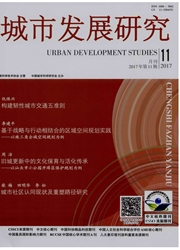

 中文摘要:
中文摘要:
流动摊贩的治理一直是我国城市管理的难题.通过对流动摊贩、疏导区摊贩和城市管理者的调查,研究了广州摊贩空间疏导的模式与效应.疏导区是一种通过发挥基层政府和社会的作用,把闲置空间资源转化为摊贩经营场所的治理模式.调查显示,83%的流动摊贩对疏导区持否定和怀疑态度.究其原因,疏导区存在正负效应,前者表现在为摊贩提供了稳定的经营场所、良好的经营环境和扩大经营规模的机会,后者表现在租金商业化、空间固定化、区位限制和进入权不平等等剥夺了摊贩低成本、流动性等优势和降低了摊贩对政策的信任.寻求适度正规化,使摊贩进入疏导区后的收益大于损失,应是改善摊贩疏导政策的核心.
 英文摘要:
英文摘要:
Street vending has become a major challenge to urban management. Using materials from the interviews with informal vendors, formal vendors and governmental officers, this paper investigates the effect of the policy of permitted vending places for street vendors in Guangzhou. This policy provides permitted vending places by turning idle urban lands into commerce spaces, and by mobilizing the roles of street-level governments, villagers committees and property management companies. However, most of street vendors hold negative and skeptical attitudes to the policy. The reason is that as a way of formalization this policy has both positive and negative effects. Although the policy provides guaranteed and environmentally improved business places to vendors and enables them to enlarge business scale, it eliminates the merits of street vending such as low cost and flexibility. It is argued that formalization of informality has a double-edged sword effect in terms of that it eliminates both disadvantage and advantage of informal economies. Therefore, seeking appropriate degree of formalization so as to make the benefit from formalization exceed the loss from it is important for the improved governance of street vendors.
 同期刊论文项目
同期刊论文项目
 同项目期刊论文
同项目期刊论文
 期刊信息
期刊信息
